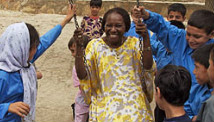STORY HIGHLIGHTS
- Girl played two season of tackle football before archdiocese enforced boys-only rule
- Caroline Pla says she's laid her share of licks on the boys and has never been hurt
- Mom's change.org petition snares 100,000 signatures after appeals to archdiocese fail
- Archbishop tells Caroline he's only trying to protect her, it's disrespectful to involve media
Philadelphia (CNN) -- Caroline Pla has been playing football since kindergarten, and for the past two years, the 11-year-old has been knocking opposing players on their butts.
It never occurred to her that someone might need to protect her from the sport she adores.
Her playing time with the Catholic Youth Organization ended after last season when the Archdiocese of Philadelphia enforced its "boys only" policy for football, sidelining the All-Star guard and defensive end.
Inspired by her older brother, George, 14, Caroline started playing Pop Warner flag football at age 5 and was hooked. Once she got too big to play Pop Warner, she signed up to play tackle football with the CYO in the fifth grade.
Two games into Caroline's second season, head coach Chip Ross received an unexpected call from Jason Budd, deputy secretary for Catholic education for the archdiocese, who oversees the football program.
Caroline's older brother, George, 14, inspired her to become a football player when she was 5.
The 5-foot-3, 110-pound sixth-grader, Budd explained to Ross, could no longer play for the Romans because, according to the CYO handbook, football is a full-contact sport -- no girls allowed.
Unaware such a rule existed, Ross was shocked, he said.
"She should be allowed to play," said Ross, who also coaches football at a nearby high school. "Football is a sport that culls out the folks that can hang or not hang, and certainly, Caroline has been more than able to hold her own."
League of their own
Not wanting to disrupt the season or ostracize Caroline, Ross and her parents kept the news under wraps and pleaded with the archdiocese to let her finish the season. After a week of corresponding with Budd, including sending a letter of support from the family's church pastor, an extension was granted.
There are 46 football programs, each with junior varsity and varsity teams, under the Archdiocese of Philadelphia CYO. Of the nearly 2,500 participants, Caroline is the only female player.
The coaches waited until the end of the season to tell Caroline and her teammates that she was off the team because of the archdiocese's "boys only" rule.
The 11-year-old has played since kindergarten and started playing tackle football two years ago.
"I was mad," Caroline said after learning she wasn't allowed to play, "just really mad that we don't get the same opportunity as boys just because we're not a boy.
"Not only am I not going to be able to play, but girls all over aren't going to be able to sign up," she said. "And I don't think that's fair."
Though Caroline says she's never been hurt -- and has laid her share of licks on the boys -- the archdiocese said in a statement that the decision to give Caroline the boot was for her and other girls' safety.
"The Archdiocese of Philadelphia's Catholic Youth Organization currently designates football as a full-contact sport for boys only. It is important to note that most CYO sports are designated by gender, with some sports offering separate leagues for boys and girls. These measures are taken in an effort to ensure a safe and appropriate playing environment for all participants," Archdiocese of Philadelphia spokesman Kenneth A. Gavin said in a statement.
"Traditionally, football is a boys only sport due to its full contact nature. Most parents and players have preferred this; some now disagree. An archdiocesan panel of coaches, parents, pastors and experts in the sports medicine and pediatrics fields will evaluate the current rule. Calls for an immediate change in the policy are premature and unwise without adequate consultation, especially given the potential safety issues involved," the statement continued.
According to the archdiocese, budget cuts and personnel changes allowed Caroline to slip through the cracks, but she actually should've been denied the opportunity to play when she initially applied in fifth grade.
The boys were uncomfortable at first, but her stellar play on the field soon made gender a non-issue.
She'll 'knock you on your butt'
When she first stepped on the field, the boys on Caroline's first CYO team were uncomfortable lining up against a girl, said her former coach, Jim Reichwein. Those concerns dissipated once Caroline showed she was tough enough to pop a lineman in the mouth just like the rest of her teammates.
"We didn't make a big deal about it," said Reichwein. "Anyone who went head-to-head with her ended up on the ground. After a week, (her gender) was laid to lest."
Reichwein, who is also Caroline's basketball coach and her best friend's father, said she embodies the character and sportsmanship that football coaches so often strive to instill in their players.
"This whole fight is for other people more than it is for her," he said. "She's such a caring, kind, well-rounded young lady who's able to put a helmet on, throw a switch and knock you on your butt."
Caroline's father proudly stands with his daughter. He said the ruling is outdated.
"Girls playing football is not something new. They're not going through uncharted water or pioneering something that hasn't been addressed before," George Pla said. "The sport will determine where's she's best able to play, if she is at all."
All four Pla children are encouraged to pursue their passions, whether it's theater or football, George Pla said. Caroline's twin sister, Alexandra, uninterested in playing football, would prefer to remain on the sidelines as a cheerleader.
Caroline is fighting for all girls wanting to play football, her coaches and family members say.
Tackling the boys-only rule is bigger than just letting her twin back on the gridiron, Alexandra said.
"She's trying really hard to let girls play football," she said. "I really like to watch her play, and the rule should be changed so anyone can play."
Rally 'round the girl
After calls and e-mails to the archdiocese were unsuccessful, Caroline, no longer welcome to play football for the CYO, decided to call an audible.
With the full support of her team, Caroline's mom, Seal Pla, started an online petition at change.org to encourage the archdiocese to allow girls to play football.
Her original goal was to get 100 signatures. There are now more than 100,000.
One signer is 9-year-old peewee football sensation Samantha "Sweet Feet" Gordon from Utah. She was recently featured on a Wheaties box and made a November appearance on "NFL Gameday Morning," where she showed off her moves to Hall of Famers Marshall Faulk and Warren Sapp. She also was invited to this year's Super Bowl in New Orleans, where she blogged for four days for espnW.com, which focuses on female athletes.
Even Philadelphia Councilman and devout Catholic Jim Kenney fired off an official letter to the archdiocese, saying the issue "hits close to home."
Alexandra, 11, a cheerleader, likes to watch her twin sister play and wants the rule changed.
"The archdiocese is one of the last remaining defenders of gender discriminating in sports, so let us proudly take a giant leap forward in Catholic education today by purging this archaic rule from the CYO handbook," he wrote.
Caroline also caught the attention of talk show host Ellen DeGeneres.
Sporting her navy and gold football jersey on set, Caroline won over the crowd during her appearance last month.
When asked whether she's gotten hurt, the crowd erupted when she quipped with a made-for-TV smile, "I've never really gotten hurt, but I have hurt people."
Could archdiocese cut back?
Caroline's fight to get back on the field hasn't swayed the archdiocese yet, but the panel selected by the archdiocese is expected to issue a decision on the boys-only rule by mid-March.
In a final appeal, Caroline, who also competes on CYO track and basketball teams, wrote to Philadelphia Archbishop Charles Chaput after recently learning he would have the final say after the panel makes their recommendation.
In an e-mail provided to CNN by the Pla family, Chaput told Caroline he was "perplexed" that she wrote to him only after going to the media.
The archdiocese says it's trying to protect her, but Caroline wonders why she needs more protection than boys.
"I admire your love of the game, Caroline, and I'm impressed by your zeal in pursuing the opportunity to play it," he wrote. "At the same time, it's important to understand that pressure is not a good way of showing respect for dedicated people who are simply fulfilling their duty to protect young people in sports."
The chiding seems to ignore that Caroline's parents wrote the archdiocese, to no avail, before taking their daughter's cause public, the Plas said.
Though it's now basketball season for Caroline, she isn't giving up her fight. She's not being disrespectful when she says the archbishop's claim that he's just trying to protect her doesn't ring true.
"I was just really surprised that we're not allowed to play because we're girls," Caroline said. "They say it's a safety issue, but I don't get that because it's not just a safety issue for us; it's a safety issue for anybody that goes on to the field."













